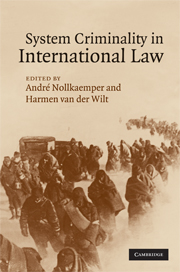Book contents
- Frontmatter
- Contents
- Preface
- Table of cases
- Table of treaties and international instruments
- List of abbreviations
- List of contributors
- 1 Introduction
- 2 The policy context of international crimes
- 3 Why corporations kill and get away with it: the failure of law to cope with crime in organizations
- 4 Men and abstract entities: individual responsibility and collective guilt in international criminal law
- 5 A historical perspective: from collective to individual responsibility and back
- 6 Command responsibility and Organisationsherrschaft: ways of attributing international crimes to the ‘most responsible’
- 7 Joint criminal enterprise and functional perpetration
- 8 System criminality at the ICTY
- 9 Criminality of organizations under international law
- 10 Criminality of organizations: lessons from domestic law – a comparative perspective
- 11 The collective accountability of organized armed groups for system crimes
- 12 Assumptions and presuppositions: state responsibility for system crimes
- 13 State responsibility for international crimes
- 14 Responses of political organs to crimes by states
- 15 Conclusions and outlook
- Index
2 - The policy context of international crimes
Published online by Cambridge University Press: 08 October 2009
- Frontmatter
- Contents
- Preface
- Table of cases
- Table of treaties and international instruments
- List of abbreviations
- List of contributors
- 1 Introduction
- 2 The policy context of international crimes
- 3 Why corporations kill and get away with it: the failure of law to cope with crime in organizations
- 4 Men and abstract entities: individual responsibility and collective guilt in international criminal law
- 5 A historical perspective: from collective to individual responsibility and back
- 6 Command responsibility and Organisationsherrschaft: ways of attributing international crimes to the ‘most responsible’
- 7 Joint criminal enterprise and functional perpetration
- 8 System criminality at the ICTY
- 9 Criminality of organizations under international law
- 10 Criminality of organizations: lessons from domestic law – a comparative perspective
- 11 The collective accountability of organized armed groups for system crimes
- 12 Assumptions and presuppositions: state responsibility for system crimes
- 13 State responsibility for international crimes
- 14 Responses of political organs to crimes by states
- 15 Conclusions and outlook
- Index
Summary
Genocide, mass killing, torture, ethnic cleansing, and other gross violations of human rights are defined as war crimes or crimes against humanity under international law. To develop an adequate explanation of such actions, which is the task of social psychology, and an adequate legal response to them, which is the task of international law, requires going beyond the characteristics of individual perpetrators or even of the situations in which these practices take place. It requires close examination of the political system and of the policy process in which these actions are embedded and that provide the larger context for them.
Crimes of obedience
As a first step in this examination, we must define the special nature of the crimes under consideration. Some instances of such crimes may well constitute ‘ordinary’ crimes – that is, crimes committed in violation of the expectations and instructions of authority. Participation in massacre, torture, or ethnic cleansing would be an ordinary crime in this sense if it were carried out by individual perpetrators on their own initiative and in disregard of the policies and orders of the authorities under which they function. Even a crime committed in the context of an authorized activity – such as a military operation or interrogation of prisoners – could be treated as an ordinary crime if the perpetrator went beyond legally permissible limits: if, for example, a soldier on a reconnaissance mission indiscriminately shot civilians, or if an interrogator used means of pressure in excess of what the rules permitted.
- Type
- Chapter
- Information
- System Criminality in International Law , pp. 26 - 41Publisher: Cambridge University PressPrint publication year: 2009
- 7
- Cited by



